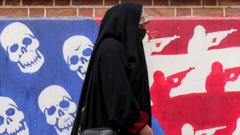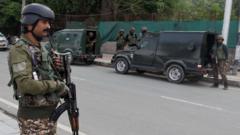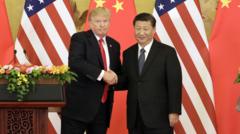Both nations prepare for high-stakes dialogue amidst fears of nuclear escalation.
**US and Iran Remain Distant Before Crucial Nuclear Negotiations**

**US and Iran Remain Distant Before Crucial Nuclear Negotiations**
Tensions Heighten as Diplomatic Efforts Commence Ahead of US-Iran Nuclear Talks
In a dramatic turn of events, the United States is once again focusing its diplomatic efforts on Iran’s nuclear ambitions. As President Donald Trump steps into negotiations, the stakes are incredibly high for both countries, which remain deeply divided. Originally established in 2015, the Joint Comprehensive Plan of Action (JCPOA) aimed to limit Iran's nuclear capabilities in exchange for lifted economic sanctions. However, the US withdrawal from the deal in 2018 has led to heightened tensions and escalation in Iran’s enrichment of uranium, which analysts warn puts the nation alarmingly close to developing a nuclear weapon.
Trump's administration has since reinstated a "maximum pressure" policy on Iran, reimposing sanctions and calling for rigorous inspections of Iran’s nuclear facilities. Recently, the US has made overtures for direct talks, with discussions set to take place in Oman over the weekend. Trump has warned Iran that failure to secure a deal could lead to military action, heightening fears of a potential military conflict. Meanwhile, Iran's leadership is reportedly willing to negotiate—to an extent—but fears that any agreement could be met with significant opposition from hardline factions within the country.
Iran’s economy continues to suffer significantly from sanctions, and while there are indications of a willingness to compromise, stipulations from the US demand complete dismantling of any nuclear programs, which could be an insurmountable obstacle. The intricate geopolitical landscape presents additional challenges, as Israel's hardline stance demands the total abolishment of Iran's nuclear capabilities, deepening the complexities surrounding the negotiations.
Though both nations have expressed a willingness to engage in discourse, achieving a mutual agreement appears to be an uphill battle. As the specter of increased military intervention looms, the consequences of a failed negotiation could be catastrophic, not just for the US and Iran, but for the entire region.
Should the discussions falter, military options, particularly from Israel, remain on the table, though the risks involved in such operations are significant. For now, Trump’s administration has set a two-month timeline for negotiations to reach a resolution similar to the JCPOA, even as previous talks on the matter took years to reconcile. Whether these high-stakes discussions can yield a peaceful outcome remains uncertain in the face of irreconcilable differences.
Trump's administration has since reinstated a "maximum pressure" policy on Iran, reimposing sanctions and calling for rigorous inspections of Iran’s nuclear facilities. Recently, the US has made overtures for direct talks, with discussions set to take place in Oman over the weekend. Trump has warned Iran that failure to secure a deal could lead to military action, heightening fears of a potential military conflict. Meanwhile, Iran's leadership is reportedly willing to negotiate—to an extent—but fears that any agreement could be met with significant opposition from hardline factions within the country.
Iran’s economy continues to suffer significantly from sanctions, and while there are indications of a willingness to compromise, stipulations from the US demand complete dismantling of any nuclear programs, which could be an insurmountable obstacle. The intricate geopolitical landscape presents additional challenges, as Israel's hardline stance demands the total abolishment of Iran's nuclear capabilities, deepening the complexities surrounding the negotiations.
Though both nations have expressed a willingness to engage in discourse, achieving a mutual agreement appears to be an uphill battle. As the specter of increased military intervention looms, the consequences of a failed negotiation could be catastrophic, not just for the US and Iran, but for the entire region.
Should the discussions falter, military options, particularly from Israel, remain on the table, though the risks involved in such operations are significant. For now, Trump’s administration has set a two-month timeline for negotiations to reach a resolution similar to the JCPOA, even as previous talks on the matter took years to reconcile. Whether these high-stakes discussions can yield a peaceful outcome remains uncertain in the face of irreconcilable differences.






















